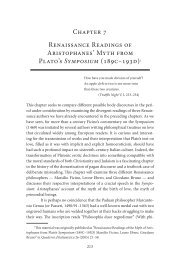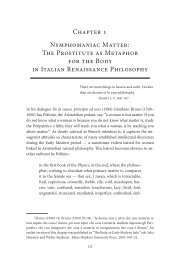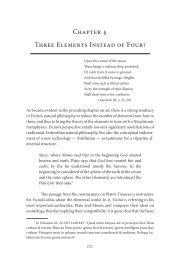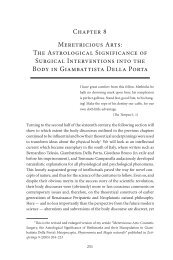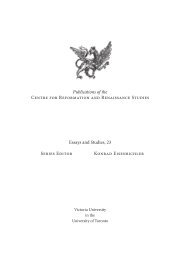Chapter 2 Matter as a Mirror: Marsilio Ficino and Renaissance ...
Chapter 2 Matter as a Mirror: Marsilio Ficino and Renaissance ...
Chapter 2 Matter as a Mirror: Marsilio Ficino and Renaissance ...
Create successful ePaper yourself
Turn your PDF publications into a flip-book with our unique Google optimized e-Paper software.
<strong>Matter</strong> in <strong>Ficino</strong>’s Cosmology<br />
<strong>Matter</strong> <strong>as</strong> a <strong>Mirror</strong> 55<br />
According to <strong>Ficino</strong>, matter is a principle in its own right <strong>and</strong> it is distinct<br />
<strong>and</strong> separable from form. The latter principle is imposed on, or given to the<br />
former by some supreme <strong>and</strong> divine artist. 25 <strong>Ficino</strong>’s ide<strong>as</strong> about the material<br />
<strong>as</strong>pect of creation are thus related to questions of origin <strong>and</strong>, more precisely,<br />
of (male) authorship: what w<strong>as</strong> created first by God, forms or matter? It seems<br />
likely that the Godhead first brought forth the unchanging <strong>and</strong> hierarchically<br />
higher “noble” forms which were to shape “b<strong>as</strong>e or common” matter.<br />
However, <strong>and</strong> quite unexpectedly, in several crucial p<strong>as</strong>sages <strong>Ficino</strong> maintains<br />
that God created shapeless materia before He created forms. 26 One especially<br />
pressing problem in this discussion is whether, according to Platonic<br />
myths of creation, the supreme God not only created but also shaped matter<br />
or whether this second t<strong>as</strong>k w<strong>as</strong> left to one or more demiurges, inferior gods<br />
whose duty it w<strong>as</strong> to shape the chaotic primordial matter in accordance with<br />
the forms flowing from the divinity. 27 Though the latter account of creation is<br />
not in accordance with Christian doctrines, it h<strong>as</strong> the advantage of explaining<br />
the process of creation in accordance with human forms of creativity. 28 The<br />
following p<strong>as</strong>sage from <strong>Ficino</strong>’s commentary on the Timaeus is a good summary<br />
of these problems.<br />
Is God not only the author of the worlds, but also the former<br />
of matter? That would have been the answer given by the<br />
school of Ammonius <strong>and</strong> Origen. In the Parmenides, matter<br />
h<strong>as</strong> to be viewed <strong>as</strong> originating from God in a certain way:<br />
where<strong>as</strong> in the Timaeus — on the grounds that matter also<br />
accepts the good from God —, it h<strong>as</strong> to exist before <strong>and</strong> then it<br />
is to be thought of <strong>as</strong> something good. The common school of<br />
Platonists though would have a different opinion, maintaining<br />
25 De amore V 5; see <strong>as</strong> precedents, Metaphysics VII, 7: 1032a26–b21; Plotinus, En-<br />
neads V, 8, 1.<br />
26 In Timaeum chapt. 26, OO 1449/445–145/446. On the Theologia XVII, 2, see infra.<br />
27 In Timaeum chapt. 41, OO 1463/461: “Quae autem de materia prima sit inter Platonicos<br />
ambiguit<strong>as</strong>, narravimus ab initio. M<strong>and</strong>at ergo posthac architectus mundi filiis<br />
suis, id est animabus sphaerarum stellarumque et daemonum […] ut ad imitationem sui,<br />
mixtionemque sub Luna rerum aggrediatur, hominisque subjiciant omnia […].”<br />
28 On this, <strong>and</strong> <strong>Ficino</strong>’s connections with Arianism, see Allen (1987) 438–439.



